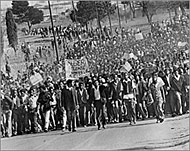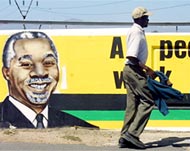S Africa allows new ‘Dr Death’ trial
South Africa’s top court has given prosecutors permission to re-open a case against Wouter Basson, dubbed “Dr Death” for bizarre apartheid-era plots involving germ warfare and the murder of black opponents.

The Constitutional Court said the former head of the white government’s germ-warfare programme should face trial on six charges of conspiracy to commit offences beyond South Africa’s borders, the SAPA news agency reported.
Basson was one of the most notorious agents of South Africa’s former white government, accused of helping with a series of poisoning plots targeting black activists and involving gadgets such as screwdrivers concealing hypodermic needles and cigarettes laced with anthrax.
Dubbed Dr Death in the popular press, Basson was also accused of misappropriating government cash to fund a lavish lifestyle and drug dealing.
However, Basson on Tuesday denied knowledge of the crimes and promised to beat new charges to be brought against him.
International law
Basson was acquitted of murder, drug trafficking, fraud and theft in 2002 by a white judge whose impartiality was subsequently challenged by prosecutors.
The Supreme Court of Appeal in 2003 declined to overturn the acquittal.
 |
|
The white minority government |
The government turned to the Constitutional Court, arguing that Basson should be charged with crimes committed in London, Namibia, Swaziland and Mozambique which were dropped from the first case on the grounds that South Africa had no jurisdiction in these countries.
The Constitutional Court upheld that argument, saying in a unanimous ruling that it was South Africa’s obligation under international law to prosecute charges which amount to crimes against humanity, SAPA said.
Basson had denied responsibility for political murders carried out with his toxins and claims he was only following orders from senior officials in the white government, which gave up power in 1994 with the country’s first multi-racial elections.
“The judge has already said I am innocent, and I am,” he said during a live radio interview on Tuesday.
Not concerned
Basson said he was not concerned about the ruling as he had already effectively beaten the six charges, that were included in an “omnibus” charge added to his original case.
“The state presented hundreds of pages of evidence, umpteenth witnesses on every one of those six charges. We are convinced that the state does not have any more evidence,” he said.
Basson, a skilled surgeon now practising in Cape Town, said he had no regrets and suggested that accusations against him were misdirected and exaggerated.
 |
|
White monopoly on power ended |
“There is a large tendency to exaggerate whatever happened in the past … . I am not ashamed of what I have done. I learned a lot and it was a great time in my life,” he said.
Basson said he was unaware that crimes were being conducted using his research and that he was only following orders from senior officials in the white government, which gave up power in 1994 with the country’s first all-race election.
“I’m not sure who was responsible for these incidences, and I am not sure there were as many as there were,” Basson said.
A former army brigadier, Basson was head of the apartheid government’s chemical and biological warfare programme for 12 years when South African troops were fighting black nationalists in neighbouring Namibia, Angola and at home.
During the trial, the court heard of plots to kill prominent black politicians with schemes as bizarre as an umbrella that fired deadly pellets, or lacing their clothes with toxins, as happened with anti-apartheid activist Frank Chikane, who was poisoned on a trip to the United States in 1989.
Poison
Originally indicted on 67 charges in March 1999, Basson’s defence early into his trial managed to quash several counts related to alleged conspiracies to murder opponents of the apartheid government in London, Namibia, Mozambique and Swaziland.
“There is a large tendency to exaggerate whatever happened in the past … . I am not ashamed of what I have done. I learned a lot and it was a great time in my life” |
One of those charges alleged that Basson supplied knockout drugs to about 200 South West African People’s Organisation (SWAPO) guerrillas in Namibia before dumping them from a plane into the ocean.
Basson was also allegedly involved in the poisoning of the water supply of a Swapo refugee camp with cholera bacteria in 1989.
It was the third time that the state had sought to appeal the acquittal of Dr Death, who was first arrested in February 1997.